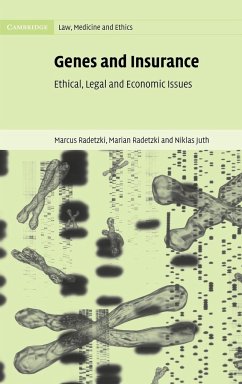The result of two key social developments in recent years are examined here: the partial dismantling of the welfare state and the progress of genetics. Genetic insights are becoming increasingly valuable for risk assessment, and insurers would like to use these insights to help determine premiums. Combined with the fact that social welfare is being curtailed, this could potentially create an uninsured high-risk population. Along with considerations of autonomy and privacy, this is the basis for an ethical critique of insurer's access to information. The result has often been regulation of such information; but the authors argues that due to adverse selection, regulation will not solve these problems, and this may jeopardize the survival of private personal insurance. Instead, we should look towards the resurrection of social insurance, a key component of the welfare state. This will interest academic researchers as well as professionals involved with genetics and insurance.
Table of contents:
Foreword; 1. Introduction; Part I. Starting points: 2. The terminology and possibilities of genetics; 3. Opportunities for insurers to use genetic information; Part II. Social, Economic and Legal Aspects: 4. Social insurance in the modern welfare state: emergence, maturity and partial dismantling; 5. International trade in personal insurance; 6. Prohibitions against discrimination in the private sphere: does the legislation build on a consistent foundation? Part III. Ethical Aspects: 7. Ethical arguments for and against insurance companies' right to genetic information; Part IV. Evaluation: 8. Conclusions and policy implications; References.
The genetic information that is available to insurance companies has often been regulated to avoid certain ethical difficulties. But regulation may not be the solution, argue the authors, and suggest instead the resurrection of collectively funded public insurances. This will interest academic researchers and professionals involved with genetics and insurance.
Considers problems associated with genetic information in an age of declining welfare provision, and offers direction for future policy.
Hinweis: Dieser Artikel kann nur an eine deutsche Lieferadresse ausgeliefert werden.
Table of contents:
Foreword; 1. Introduction; Part I. Starting points: 2. The terminology and possibilities of genetics; 3. Opportunities for insurers to use genetic information; Part II. Social, Economic and Legal Aspects: 4. Social insurance in the modern welfare state: emergence, maturity and partial dismantling; 5. International trade in personal insurance; 6. Prohibitions against discrimination in the private sphere: does the legislation build on a consistent foundation? Part III. Ethical Aspects: 7. Ethical arguments for and against insurance companies' right to genetic information; Part IV. Evaluation: 8. Conclusions and policy implications; References.
The genetic information that is available to insurance companies has often been regulated to avoid certain ethical difficulties. But regulation may not be the solution, argue the authors, and suggest instead the resurrection of collectively funded public insurances. This will interest academic researchers and professionals involved with genetics and insurance.
Considers problems associated with genetic information in an age of declining welfare provision, and offers direction for future policy.
Hinweis: Dieser Artikel kann nur an eine deutsche Lieferadresse ausgeliefert werden.








